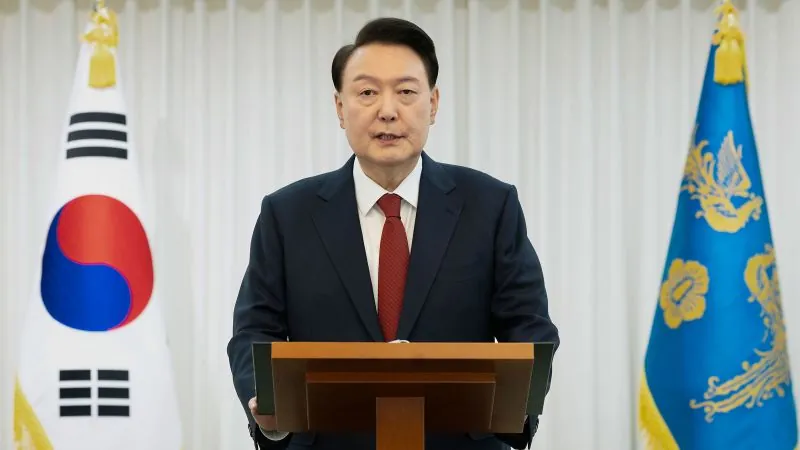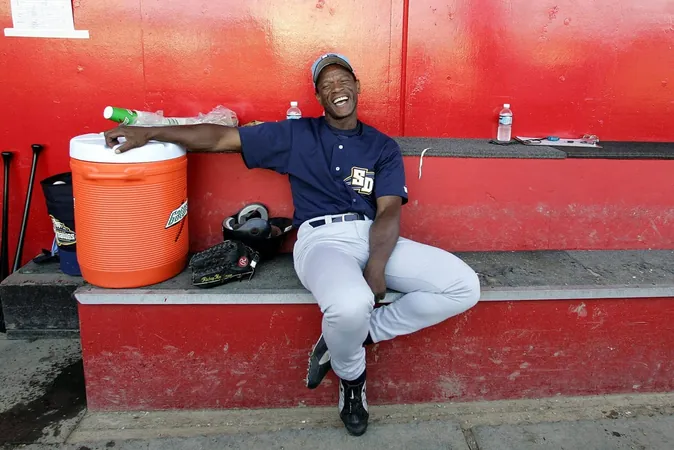
South Korea's President Yoon Suk Yeol Impeached Amidst Controversial Martial Law Attempt
2024-12-14
Author: Wai
Introduction
In a historic and unexpected move, South Korea's parliament voted to impeach President Yoon Suk Yeol on Saturday, following a failed martial law declaration that sent shockwaves through the nation. This significant political event unfolded after Yoon's own People Power Party turned against him, expressing dissatisfaction over his refusal to resign despite widespread controversy surrounding his administration.
Background of Impeachment
This marks the second time in less than a decade that a South Korean leader has faced impeachment, as Yoon now awaits a ruling from the Constitutional Court, during which time he is suspended from exercising his presidential powers.
Parliamentary Vote and Public Reaction
The parliamentary vote, which resulted in 204 lawmakers supporting the impeachment and 85 opposed, sparked jubilant celebrations among thousands of protesters gathered outside the National Assembly in Seoul. Yoon responded to the decision with a statement pledging his commitment to the nation, despite the setback. "I will not give up," he insisted, asserting his dedication to the journey shared with the people over the past two years.
Transition of Power
Acting under South Korean law, Prime Minister Han Duck-soo will assume the presidency in Yoon's absence and has vowed to ensure stable governance during this tumultuous period. Meanwhile, the leader of the opposition Democratic Party, Kang Sun-woo, expressed hope for a revived democracy, stating, “The great democracy of South Korea will survive and will be born again.”
The Martial Law Declaration
The impeachment proceedings stem from a dramatic incident last month when Yoon declared martial law, dispatching military personnel to parliament, leading to chaos as lawmakers clashed with soldiers to reject the decree. Many perceived Yoon's actions as an alarming deviation from democratic principles, galvanizing public sentiment against him.
Public Sentiment and Protests
As protests erupted, with demonstrators chanting for his resignation, a small group of Yoon's supporters also gathered to express their solidarity, raising flags and calling for him to remain in office. The political landscape is thus polarized, with Yoon's supporters and opponents severely divided.
Allegations of Abuse of Power
At the center of his downfall is an alleged abuse of power, as Yoon faced backlash for invoking martial law to manage political gridlock exacerbated by a parliament with an opposition majority. Investigations are now underway to explore potential treasonous activities linked to Yoon, with ongoing probes into his administration's decision-making leading to the martial law declaration.
Legal Repercussions and Investigations
Key figures, including former Defense Minister Kim Yong-hyun, have faced legal repercussions, with allegations surfacing of suggestions to impose martial law. Kim's situation turned dire following his detention, where he allegedly attempted to take his own life.
Scrutiny of Acting President
Adding to the complexity of the situation is the investigation into Han Duck-soo, the acting president, who is also under scrutiny for his involvement in the martial law decision.
Future of South Korea’s Democracy
As South Korea braces for an uncertain political future, the country echoes memories of its past impeachment crisis of 2016-2017, which saw former President Park Geun-hye ousted and imprisoned over corruption allegations.
Conclusion
With protests ongoing and legal proceedings anticipated, South Korea’s vibrant democracy faces a crucial juncture, one that could redefine not only its leadership but also the fundamental principles upon which it stands. Will this be the resurgence of democracy, or a step back into chaos? Time will reveal the unfolding story of South Korea's political landscape.


 Brasil (PT)
Brasil (PT)
 Canada (EN)
Canada (EN)
 Chile (ES)
Chile (ES)
 España (ES)
España (ES)
 France (FR)
France (FR)
 Hong Kong (EN)
Hong Kong (EN)
 Italia (IT)
Italia (IT)
 日本 (JA)
日本 (JA)
 Magyarország (HU)
Magyarország (HU)
 Norge (NO)
Norge (NO)
 Polska (PL)
Polska (PL)
 Schweiz (DE)
Schweiz (DE)
 Singapore (EN)
Singapore (EN)
 Sverige (SV)
Sverige (SV)
 Suomi (FI)
Suomi (FI)
 Türkiye (TR)
Türkiye (TR)